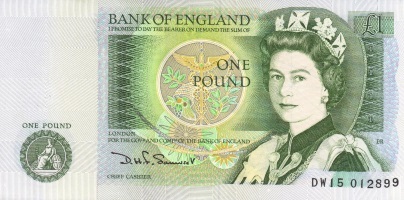A Quid

We are moving inexorably towards a cashless society, with around 39% of adults in the UK living without cash in 2023 and just 12% of all payments made with cash. According to UK Finance one third of UK adults now use mobile contact payments at least once a month. That said, a recent KPMG survey revealed that 77% of respondents would be concerned if the UK went completely cashless and 53% revealed that they still used cash at least once a week.
The reasons for the flight from cash are fairly clear: the closure of banks, the reduction in the numbers of Automatic Teller Machines, the increase in online shopping, the ease and convenience of digital payments, post-Covid concerns about the cleanliness of cash and the move by many businesses to a card first approach. Some, if not all, of these reasons feed into a vicious circle which will inevitably lead to the further marginalization of cash.
For some of us, though, there is something nostalgic and reassuring about a pocketful of change. A piece of plastic 85.6mm wide and 53.98mm tall might be light and convenient but it will never endear itself like our quids, bobs, and tanners. I came across a tin of pre-decimalisation coins and notes the other day and was immediately overwhelmed by a wave of nostalgia and curiosity, suddenly realizing that I had no idea how they had earned their nicknames.
Take a quid, the slang term for a pound, which has been in use in English since at least 1661. The first pounds were known as Sovereigns and then Guineas, the latter later being used to denote twenty-one shillings. Where quid was derived form remains shrouded in mystery. Some, including Brewster’s, think that its origins lie in the Latin phrase, quid pro quo, where something is given in exchange for something else, in this context a good or service for the proffering of a note. A variant theory is that it came from the notation “quid”, from the Latin for something, used by London Goldsmiths to mark on receipts and promissory notes they issued in lieu of their deposited gold.
Continuing the Italian theme, others think that the term was brought over by Italian immigrants and was a corruption of the term “scudo”, the term used to denote gold and silver coins in Italy from the 16th to the 19th centuries. Alternatively, it might have come from the Gaelic cuid which is a portmanteau word to describe a thing, a piece, a possession, a thingummybob. It is said that Irish soldiers in the British Army referred to their pay as “mo chuid” and that the native English-speaking soldiers bastardised it to quid to mean a pound.
Another theory is that it is an abbreviation of the Wiltshire village of Quidhampton where was sited a paper mill that produced the paper upon which notes were printed when Britain adopted the promissory note system in 1797. This has sparked a lively debate, the consensus being that while the Quidhampton Paper Mill did exist and did produce paper for banknotes for several centuries, it was later known as Overton Paper Mill and lay between the villages of Quidhampton and Overton, west of Basingstoke in Hampshire. It was established by the Portal family who also owned and operated the Laverstoke mill, another mill producing paper for notes and now the site of the Bombay Sapphire gin distillery.
Take your pick.



